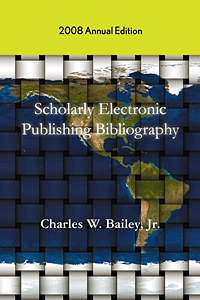The latest update of the Scholarly Electronic Publishing Weblog (SEPW) is now available. It provides information about new works related to scholarly electronic publishing, such as books, e-prints, journal articles, magazine articles, technical reports, and white papers.
Especially interesting are: "The Antaeus Column: Does the 'Open Access' Advantage Exist? A Librarian's Perspective"; "Copyright Issues in the Selection of Archival Material for Internet Access"; Creating Digital Collections: A Practical Guide; "Equity for Open-Access Journal Publishing"; "If You Build It, They Will Scan: Oxford University's Exploration of Community Collections"; "Measuring Mass Text Digitization Quality and Usefulness: Lessons Learned from Assessing the OCR Accuracy of the British Library's 19th Century Online Newspaper Archive"; "Overlay Journals and Data Publishing in the Meteorological Sciences"; "PLoS ONE: New Approaches and Initiatives in the Evolution of the Academic Journal"; "Research Data Preservation and Access: The Views of Researchers"; "The Return of FRPAA"; and "Scholarly Communication: ARL as a Catalyst for Change."

